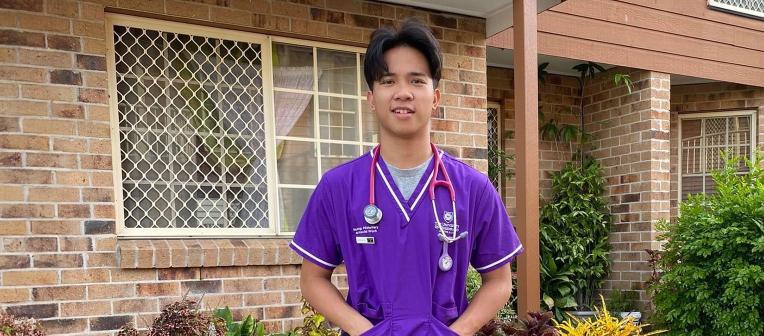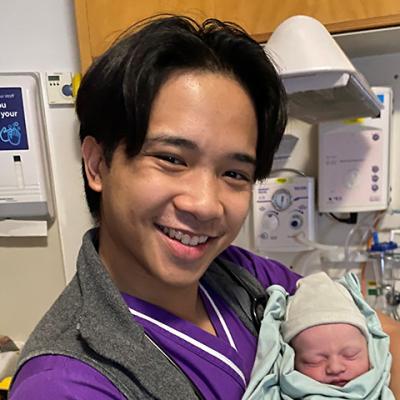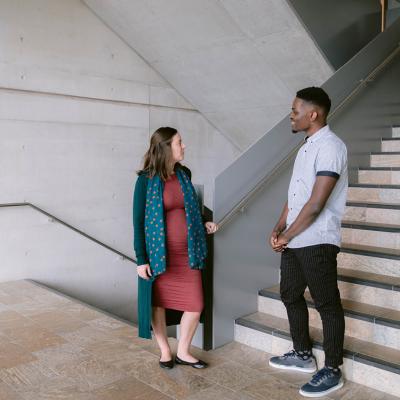When you think of a midwife, do you picture a woman? If so, you’re not alone – it’s a common image, even reinforced by definitions that describe a midwife as "usually a woman trained to help women in childbirth".
The statistics reflect this too, with only 1.5% of practising midwives in Australia being male, according to the Nursing and Midwifery Board of Australia. For Arnel, a Bachelor of Midwifery student, breaking stereotypes and challenging these statistics isn’t just a career choice – it’s a mission.
Arnel is stepping into a role that’s about much more than the delivery room. It’s about compassion, connection, and empowering families. Yet, his path here wasn’t always clear. In high school, he dreamed of being a jet pilot for the RAAF. But in time, Arnel realised he wanted a career where he could truly impact people’s lives in meaningful ways.
“I chose midwifery because it’s about being there for families, offering empathy and unconditional support,” he says.
His journey hasn’t been without its unique challenges, from cultural sensitivities to women feeling uncomfortable with a male presence. But for Arnel, these experiences have only strengthened his resolve to bring diversity to midwifery, making it a more inclusive, supportive space for everyone.
Here’s how Arnel is challenging expectations, building empowering relationships, and creating a lasting impact as he paves the way for more men in midwifery.
A career built on compassion, empathy and support
Back in high school, Arnel wasn’t sure where his future would take him – a feeling many can relate to at the age of 17.
“At one stage I was convinced I would be a fast jet pilot for the RAAF,” he says.
While a career zipping around in jets sounded thrilling, after some reflection, Arnel decided he wanted something where he could connect with people and make an impact on their lives.
“I chose midwifery, as not only do you have consistent exposure to babies, but it was also about compassion, empathy and giving unconditional support during one of the most significant moments of their lives.”
Overcoming challenges as a male midwife
As one of the few male midwives, Arnel has encountered some unique challenges that come with the role.
“It’s not uncommon for women to feel uncomfortable having a male present during certain aspects of care, particularly if they’ve experienced past trauma,” he says.
“Some cultures also have customs that prevent women from receiving care from men, so sensitivity and adaptability are key.”
For Arnel, these challenges aren’t barriers; they’re reminders to stay adaptable, compassionate, and focused on each family’s unique needs.
“I’ve learned to accept that it’s the woman’s pregnancy, and she has every right to choose the medical team she feels most comfortable with."
Why is diversity in midwifery important?
Diversity in health care makes a real difference, leading to more inclusive, well-rounded care for all.
“Having male midwives challenges stereotypes and brings new perspectives, which can lead to better communication and even help partners feel more engaged and comfortable,” says Arnel.
“For instance, I can provide reassurance and guidance for male partners, helping them feel more involved in the birthing process and better equipped to support their partners through the transition to parenthood.”
Arnel also points out that with Australia facing a midwife shortage, encouraging more men to enter the profession could help fill this gap, improving care across the board.
Building empowering relationships with mothers
For Arnel, one of the most rewarding parts of midwifery is building empowering relationships with mothers-to-be. Through the continuity of care model, Arnel provides consistent support and education at each stage of pregnancy, ensuring mothers feel informed, prepared, and in control. One memorable experience was supporting a mother throughout her entire pregnancy.
“I was part of a Midwifery Group Practice (MGP), where we provided a continuity of care model to educate and support women through each stage of pregnancy,” he says.
“The continuity of care helped her feel prepared mentally and physically for childbirth, and the experience empowered her to make her own choices."
"This experience taught me so much about supporting women’s autonomy and how our role as midwives can influence outcomes."
How can you become a midwife?
If you’re compassionate, want to make a difference, and are seeking a career that’s both challenging and deeply rewarding, midwifery might be calling you. Like Arnel, you could break down barriers, offer unique perspectives, and support families through life-changing moments.
UQ offers a Bachelor of Midwifery and a dual Bachelor of Nursing / Bachelor of Midwifery program that can provide your first step towards a purpose-driven career in health care.
Explore UQ's Bachelor of Midwifery Explore UQ's Bachelor of Nursing / Bachelor of Midwifery






